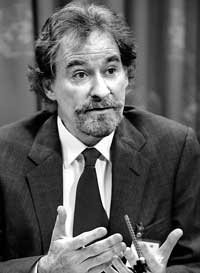
Hollywood spotlights growing trade in humansUNITED NATIONS, (IPS) - Kevin Kline, an Academy Award winning movie star, is outraged at the impunity with which human traffickers ply their trade in one of the world's growing multi-billion dollar businesses: the global sex industry."We are trying to put a human face to the problem," says Kline, who plays the role of a police officer in the movie "Trade", which premiered in the U.N. Trusteeship Council chamber Tuesday. He said the movie, which is to be commercially released shortly, will probe the inner workings of the global human trafficking network. The primary objective, Kline told reporters, is to raise the awareness of a problem "which is in plain sight -- whether in the state of New Jersey or in Mexico."
Antonio Maria Costa, executive director of the Vienna-based U.N. Office on Drugs and Crime (UNODC), said human trafficking is a 32 billion dollar-a-year business, "whose profits are second only to drugs and arms.""Most of its victims (about 80 percent) are women and girls, many of whom are forced into prostitution or otherwise exploited sexually," he told reporters Tuesday. After seeing an advance screening of "Trade", another Academy Award-winning Hollywood star, Meryl Streep, was quoted as saying that the movie provides "an unflinching peek at the secret world of sex trafficking.""Anyone who fails to have their insides roiled by this film has commenced rigor mortis," she added. Kline said the movie also focuses on the plight of a young Polish girl who is abducted and smuggled into the United States, through neighbouring Mexico, and who is drugged, raped and made to work under conditions bordering slavery. "We are trying to spotlight the problem without sensationalising it," he added. The movie is based on a 2004 New York Times Magazine article by Peter Landesman titled "The Girls Next Door". Taina Bien-Aime, executive director of the New York-based women's advocacy group Equality Now, said that art "is a powerful advocacy tool to raise awareness." "We hope this dramatic and true-to-life film will move people to take action against the scourge of sex trafficking," she said. She said that New York city Mayor Mike Bloomberg had declared September 2007 an "anti-trafficking month" in order to raise "critical awareness of the cruel and disturbing practice of human trafficking." In a statement released Tuesday, Equality Now said that every year, millions of women and girls around the world suffer unimaginable human rights violations at the hands of those who profit from the trade in human lives."Some are abducted; some are deceived by offers of legitimate work in another country; some are sold by their own poverty-stricken parents or are themselves driven by poverty into the lure of traffickers who prey on their desperation." Trafficking, it said, is a scourge that affects every country in the world. "It is one of the fastest growing criminal industries, the third largest, after the drugs and arms trade." In June, the United States released its seventh annual "Trafficking in Persons Report" which focuses on the trade in humans. At a news conference in Washington, U.S. Secretary of State Condoleezza Rice told reporters that human traffickers prey on the most vulnerable members of society, most often innocent women and children, exploiting and abusing them and profiting from their suffering. "In my travels," she said, "I have noticed a greater desire by our partners to fight this crime and protect its victims. We are helping to lead a global movement, not just to confront this crime, but to abolish it." More and more countries are coming to see human trafficking for what it is -- a modern-day form of slavery that devastates families and communities around the world, Rice added. Still, Rice said there is disturbing evidence that prosecutions have leveled off everywhere. In some cases, there are countries with major human trafficking problems, but only a couple of traffickers have been brought to justice. This year's report covered more countries than ever before -- 164 in total. "This cannot and must not be tolerated. Despite these serious concerns, much in this year's report should give us hope," she added. For example, she said, Georgia, Hungary Slovenia and Israel have all made major improvements, as have Taiwan and countries like Indonesia, Brazil, Bolivia, Peru and Jamaica. Ambassador Mark Lagon, director of the Office to Monitor and Combat Human Trafficking in Persons, said the structure of this year's report and the purpose are focused largely on "drawing the world's attention on the existence of modern-day slavery and the desperate need to eliminate it in the same way that the world ended the African slave trade more than a century ago.""Human trafficking plagues every country in one way or another, including the United States," he added. The U.S. list also includes political allies such as Saudi Arabia, India, Kuwait, Oman, Bahrain, Qatar and Algeria, while others in the list include Equatorial Guinea, Malaysia, Mexico, Russia, Armenia, China, and South Africa. Asked about the Middle East, Lagon said: "What we found as a general pattern in this report is an endemic problem of the way foreign workers are treated in the Persian Gulf, in Middle Eastern states." He pointed out that there is a recruitment pattern of people, unsuspecting people who are offered jobs as secretaries, as maids; but they end up being sex slaves or put into domestic servitude in an involuntary way. |
|| Front
Page | News | Editorial | Columns | Sports | Plus | Financial
Times | International | Mirror | TV
Times | Funday
Times || |
| |
Reproduction of articles permitted when used without any alterations to contents and the source. |
© Copyright
2007 Wijeya
Newspapers Ltd.Colombo. Sri Lanka. All Rights Reserved. |
